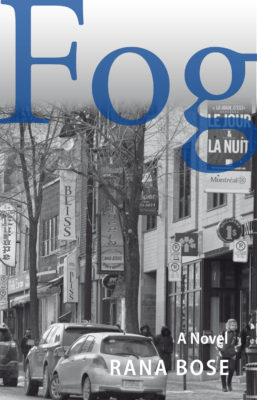Lee Child, international best-selling thriller author, says in the New York Times that writers looking for advice on writing a thrilling mystery novel are often told that creating suspense is just like preparing a cake. Focus on getting the right ingredients (sympathetic characters, interesting settings, etc.), mix them well (by subjecting protagonists to increasingly perilous problems), and voila! There’s your cake. Not everyone will be able to turn out a framboise-café shortcake, but whatever you get, it’s bound to be sweet. Child isn’t interested in dessert, however.
Keeping with the food metaphor, he argues that writers should instead be asking, “How do you make someone hungry?” The answer? “You make them wait four hours for dinner.” If you are going to write a suspense novel (or any novel, really), you need to pose a question at the beginning. And then delay the answer.
Within the first few pages of Rana Bose’s third novel, readers will be asking themselves a lot of questions. The narrator of Fog comes home to find two men in his apartment armed with padded baseball bats. He’s beaten mercilessly and regains consciousness in the hospital. The attack, while devastating, doesn’t appear to be totally unexpected. There’s mention of “the suspect,” a woman named Corinthe. She may have hired a hit team to kill the narrator, who recently joined “the company.” Who is Corinthe? The narrator? What is the company? What exactly is going on?

Fog
Rana Bose
Baraka Books
$24.95
paper
232pp
9781771861847
The narrator, Chuck Bhatt, is a young writer living on the Main in Montreal. He works part-time at a courier company, spending most of his aimless days sitting in cafes or bars, “staring through finger-stained window panes.” Bose is at his best when he’s describing the neighbourhood, the particular way that disparate individuals living in proximity to one another come to form a fragile, almost invisible web of community. The Main of the novel is a lived-in space.
Somehow the author fails to capture that realness in his central characters. The narrator is observant, with refined tastes and specific, obscure knowledge (describing a bumpy bus ride in Afghanistan, he writes “my tibia rose to butt against my patella while the meniscal cartilages desperately tried to shoulder the responsibility of the bus’s missing shock absorbers”). And yet he speaks like an awkward teenager, a dude-bro shouting out clichés: “We’re thick as thieves!” or “Okay! Don’t need the gory details.” His friend Nat, an aspiring actor who abandons Montreal for Afghanistan in the aftermath of the US-led war, isn’t any better drawn.
Fog has some ingredients – a finely detailed setting, a strained friendship between two young men – that point to the novel’s potential as a suspenseful work about the lost men of a neighbourhood. It’s disappointing that some of the other ingredients lack the same quality. There are many books which manage to satisfy a reader’s twin hungers for a well-plotted crime story and an incisive exploration of a place and its people – novels by Attica Locke, Dennis Lehane, and Vancouver’s Sam Wiebe come to mind (though the list is much, much longer). Despite the promise shown in Bose’s evocative depiction of the Main, Fog isn’t among them. mRb






0 Comments